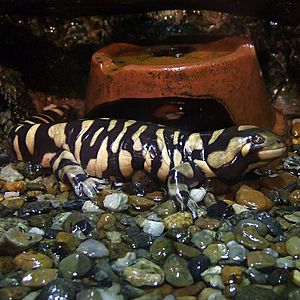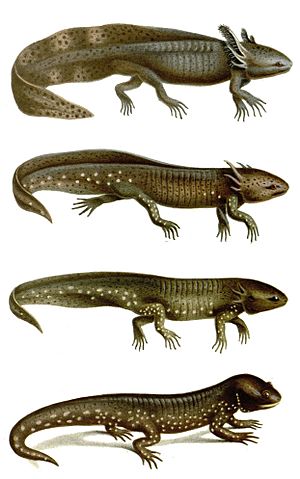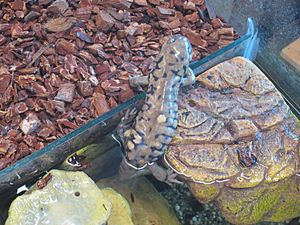Barred tiger salamander facts for kids
Quick facts for kids Barred tiger salamander |
|
|---|---|
 |
|
| Scientific classification |
|
| Kingdom: | Animalia |
| Phylum: | Chordata |
| Class: | Amphibia |
| Order: | Urodela |
| Family: | Ambystomatidae |
| Genus: | Ambystoma |
| Species: |
A. mavortium
|
| Binomial name | |
| Ambystoma mavortium Baird, 1850
|
|
| Script error: The function "autoWithCaption" does not exist. | |
Script error: No such module "Check for conflicting parameters".
The barred tiger salamander (Ambystoma mavortium) is a type of mole salamander. You can find it in southwestern Canada, across the western United States, and down to northern Mexico. It's also called the western tiger salamander.
Contents
What Does a Barred Tiger Salamander Look Like?
These salamanders usually grow to be about 15 to 22 centimeters (6 to 9 inches) long. Some can even reach up to 30.5 cm (12 inches)! This makes them one of the biggest salamanders in North America. They have a wide head and a strong body.
Their colors can be different depending on where they live. Most are grey, dark brown, or black. They have yellow bars and spots, which makes them look a bit like a tiger! Their belly can be light or dark. Young salamanders (larvae) have dark and light spots on their back and pale stripes on their sides.
How Do Barred Tiger Salamanders Behave?
Barred tiger salamanders are mostly active at night. They are not picky eaters and will eat almost anything they can catch. This includes insects, slugs, and earthworms. As adults, they live on land. But when they are young (larvae), they live completely in water and have gills to breathe.
They can breed during most months of the year. The female lays her eggs in water. The young salamanders then grow up in the water.
Special Eating Habits
Some barred tiger salamanders have a special way of eating. They can develop a "cannibalistic" form. This means they have larger teeth and wider heads. These features help them catch and eat bigger prey, including other salamanders. This special form helps them survive when there isn't much food around.
Scientists found that if these salamanders live near fathead minnows, they might start eating them. Since both animals eat similar things, the salamanders' wider heads help them eat the larger minnows. This reduces the competition for food between the two species.
Growing Up Faster
The cannibalistic tiger salamanders often change from their water-living larval stage to their land-living adult stage earlier. This is called metamorphosis. This happens more often in dry areas or shallow waters where there is a lot of competition for food. Changing faster helps them survive better in tough conditions.
Different Types of Barred Tiger Salamanders
There are five types, or subspecies, of the barred tiger salamander:
- Gray barred tiger salamander (A. m. diaboli)
- Barred tiger salamander (A. m. mavortium)
- Blotched tiger salamander (A. m. melanostictum)
- Arizona tiger salamander (A. m. nebulosum)
- Sonoran tiger salamander (A. m. stebbinsi)
Where Do Barred Tiger Salamanders Live?
You can find barred tiger salamanders in western Canada and the western United States. They are not common in California and Nevada. In Canada, they live in British Columbia, Alberta, Saskatchewan, and Manitoba. In the U.S., their range goes all the way down to Texas. They don't usually live east of the Dakotas and Oklahoma.
People have also brought them to southern Arizona. This is because their young (larvae) are sometimes used as bait for fishing.
These salamanders mostly live on land. They can be found in different places like forests, woodlands, open fields, grasslands, and even deserts. Sometimes, you might even spot them near streams.
Are Barred Tiger Salamanders in Danger?
It's thought that the number of barred tiger salamanders has gone down over the years. This is probably because of things like cutting down forests and losing their natural homes. Also, new types of fish that eat salamander larvae have been brought into some areas. This might also be causing their numbers to drop, but more research is needed to be sure.
Barred Tiger Salamanders as Pets
People often keep tiger salamanders as pets. They usually hide and wait to ambush their food. In most parts of the United States, it's against the law to sell adult salamanders. Their large size makes them easy to feed, and they are quite tough, which makes them good pets.
Their young (larvae) are often sold as fishing bait. They are sometimes called "mud puppies" or "water dogs."
Barred Tiger Salamander as a State Symbol
The tiger salamander is the official state amphibian of Kansas. A second-grade class in Wichita, Kansas, helped make this happen in 1993. It is also the state amphibian of Colorado. The Colorado government recognized it on March 16, 2012.
See also
 In Spanish: Salamandra tigre barrada para niños
In Spanish: Salamandra tigre barrada para niños
 | Delilah Pierce |
 | Gordon Parks |
 | Augusta Savage |
 | Charles Ethan Porter |



